At least one in three Europeans can be exposed to asbestos at work and in the environment
WHO press release
30.04.2015 | WHO Regional Office for Europe
About one third of the 900 million people in the WHO European Region live in countries that have not yet banned the use of all forms of asbestos, and this potentially exposes them at work and in the environment. In countries where asbestos is banned, exposure persists from past use. Exposure to asbestos can cause cancer of the lungs, ovaries and larynx; mesothelioma; and asbestosis and the most efficient way to eliminate these diseases is to stop the use of all types of asbestos. At its closure, the high-level meeting on environment and health in Haifa, Israel, urgently calls upon all European countries to eliminate asbestos-related diseases.
“We cannot afford losing almost 15 000 lives a year in Europe, especially workers, from diseases caused by exposure to asbestos. Every death from asbestos-related diseases is avoidable,” says Dr Zsuzsanna Jakab, WHO Regional Director for Europe. “We urge all countries to leave the Haifa meeting to fulfil their 2010 commitment and develop policies by the end of this year that will eliminate asbestos-related diseases from the face of Europe. There is very little time left for that.”
Elimination of asbestos-related diseases was one of the major issues discussed at the Haifa meeting. Over 200 representatives of European countries and international and nongovernmental organizations attended the meeting to evaluate overall progress on environment and health in Europe.
Download the full press release here.
An “eye-opener” report: progress toward the elimination of asbestos-related diseases
The report Progress toward the elimination of asbestos-related diseases, presented at the meeting, indicates that asbestos, a group of natural fibrous minerals, is responsible for about half of all deaths from cancers developed at work. According to new estimates, deaths from mesothelioma in 15 European countries cost society more than 1.5 billion euros annually (see table in Annex).
While 37 of the 53 Member States in the Region have banned the use of all forms of asbestos, the remaining 16 countries still use asbestos, especially for building materials, and some continue to produce and export it. Even after its use has ceased, asbestos lingers in the environment, so it needs to be safely removed and disposed without delay.
“Asbestos is known as a silent killer as health disorders from exposure to it usually appear after several decades. This means that many more people are expected to fall sick and die in the coming years throughout Europe”, says Dr Guénaël Rodier, Director, Division of Communicable Diseases, Health Security and Environment.
“This new report assesses how far European countries have got in eliminating asbestos-related diseases and provides recommendations for the future.”
In one week, the Chemical Review Committee of the Rotterdam Convention will consider listing chrysotile or white asbestos, the most common form of asbestos, among the substances for which importing countries have to give their consent to the exporting party for the trade to occur.
“Elimination of asbestos-related diseases is a priority for Israel. Already in 2011 we have passed a law prohibiting the use of new asbestos, requesting removal of existing friable asbestos and guiding disposal of asbestos cement,”, says Mr David Leffler, Director-General, Ministry of Environmental Protection for Israel. “An asbestos waste removal project is conducted in Western Galilee where by December 2014, 80 thousand cubic meters of waste were cleaned in 221 sites. Databases on asbestos-related diseases are considered key to monitor asbestos’ health effects and are regularly maintained.”
Paving the way ahead for better environment and health in Europe
All European countries present at the meeting renewed their pledges to work towards meeting the time-bound targets they adopted in 2010. This includes concrete steps to:
- strengthen or establish partnerships with different stakeholders and processes, and utilize already existing policy instruments and tools;
- enhance the understanding and use of economic arguments to support action on environment and health; and
- harmonize with the forthcoming post-2015 sustainable development agenda.
They also agreed to address the environment and health challenges of the 21st century posed by:
- complex risk factors: air, water, waste or chemicals;
- complex systems of direct relevance to environment and health: food, energy or cities; and
- matters of international environment and health security: disasters and climate change.
The conclusions of the high-level meeting in Haifa are an important milestone in the run up to the Sixth Ministerial Conference on Environment and Health planned for 2017.
Notes to editors
- The 16 countries that have not yet banned all forms of asbestos are: Albania, Andorra, Armenia, Azerbaijan, Belarus, Bosnia and Herzegovina, Georgia, Kazakhstan, Kyrgyzstan, Monaco, the Republic of Moldova, the Russian Federation, Tajikistan, Turkmenistan, Ukraine and Uzbekistan.
- The five time-bound targets adopted by countries in the European Region in 2010 are to: provide safe water and sanitation to all children by 2020; create healthy and safe environments for children in their daily life by 2020; make children’s indoor environments free from tobacco smoke by 2015; safeguard children’s environments from toxic chemicals by 2015; develop policies to eliminate asbestos-related diseases by 2015.
- The seventh meeting of the Conference of the Parties to the Rotterdam Convention (RC COP-7) will be held from 4 to 15 May 2015 back-to-back with the twelfth meeting of the Conference of the Parties to the Basel Convention (BC COP-12) and the seventh meeting of the Conference of the Parties to the Stockholm Convention (SC COP-7).
Information sources
- Progress toward the elimination of asbestos-related diseases http://www.euro.who.int/en/asbestos
- Improving environment and health in Europe: how far have we gotten? http://www.euro.who.int/en/mtr-report
- Elimination of asbestos-related diseases, WHO http://www.who.int/occupational_health/publications/asbestosrelateddiseases.pdf
- The Human and Financial Burden of Asbestos in the WHO European Region, Meeting Report http://www.euro.who.int/__data/assets/pdf_file/0003/194133/RB-Asbestos-Mtg-Report-Bonn-2012.pdf
- Inclusion of chrysotile asbestos in Annex III to the Rotterdam Convention (document UNEP/FAO/RC/COP7/11) http://www.pic.int/TheConvention/ConferenceoftheParties/Meetings/COP7/Overview/tabid/4252/language/en-US/Default.aspx
- Mid-term Review site www.euro.who.int/ehp-mtr
For further information, contact the WHO Regional Office for Europe:
Cristiana Salvi (in Haifa)
Communications Officer
Mobile: +45 29 63 42 18
Email: csa@euro.who.int
Stephanie Brickman (in Copenhagen)
Communications Consultant
Tel: +45 45 33 68 44
Email: sbr@euro.who.int
Related News
Policy Dialogue On Sustainable Development, Health and Social justice in Tirana, Albania
Linking the Ostrava Declaration of the European Environment and Health Process to SDGs Agenda 2030
10.03.2018
UN Summit on Eradicating Poverty and Promoting Prosperity in a Changing World
8 days of advocacy and activism for a gender just future within the SDG process. WECF recently attended the UN summit on the Sustainable Development Goals (High Level Political Forum, HLPF) in New York and reports back on their experiences.
10.08.2017
Youth at the heart of ECO Forum's participation in Ostrava
Reporting back on WHO’s regional conference on environment and health, where WECF (and its ECO Forum delegation of 23 youths and seniors) was to advocate for a healthy future
23.06.2017
"Let's Ensure a Healthy Future" - WECF side event at WHO 6th Ministerial Conference
Protecting children from exposure to harmful chemicals to avoid irreversible damage.
14.06.2017
Midterm review of environment and health progress in the European Region
From 28 to 30 April WECF was part of the Ecoforum delegation, representing environmental organisations from the European Region, participating at the mid-term review meeting of the WHO European Environment and Health Process in Haifa, Israel
15.05.2015





































